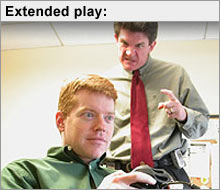An experiment failed
Majesco learns a hard lesson about the video game industry.
NEW YORK (CNNMoney.com) � On paper, the formula seems pretty solid. Blend original, critically acclaimed games with the reliable franchises based on well-known film licenses. By all accounts, that should give a publisher a fair bit of stability. That was the thinking at Edison, NJ-based Majesco, at least. Not too long ago, Majesco seemed primed to carve a fairly prominent place for itself in the gaming world. While the company had been around for years, it had been virtually invisible due to its specialization in "value software" (i.e. low retail prices and lower production values).
Things seemed to go well at first. "Bloodrayne" found an audience � and the character was the most visible in Playboy's first 'digital diva' pictorial. Minor hits followed, but the potential for real growth seemed most apparent going into 2005. In Majesco's catalog were "Advent Rising," (the first in a planned action trilogy), "Psychonauts" (which sprang from the mind of Tim Schafer, one of the industry's most talented developers) and several film licenses, including "Taxi Driver". As the year ended, though, things were anything but rosy. Majesco (Research) last week announced dreadful fourth quarter and year-end numbers. Net revenue in 4Q 2005 (traditionally the biggest quarter of the year for game publishers) was just $4.6 million, compared to $45.3 million the previous year. Twenty percent of the company's staff was laid off. Majesco had had enough. It announced plans to abandon the premium console market. "As a result of the general weakness in the [video game] sector along with the rising costs of development and marketing next-generation games, we have concluded that Majesco's current resources do not allow us to effectively compete in the big budget console game marketplace," said Jesse Sutton, president of Majesco Entertainment, in a conference call. Majesco was hardly blameless for its failings. "Advent Rising" didn't come close to living up to expectations � earning middling reviews at best. And "Bloodrayne 2" sold less than half as many copies as its predecessor, according to The NPD Group. "Psychonauts," though, was a critical darling � earning a spot on many critics' holiday buying guides. Despite this, the game never found an audience. Sales were awful, coming in at under 100,000. As for the movie licenses? "Aeon Flux," based on last year's Charlize Theron film flopped. "Taxi Driver" was cancelled as part of last week's decision. "Ghost Rider," (based on an upcoming Nicholas Cage film) was sold. And, inexplicably, Majesco has decided to move forward with the release of a game based on "Jaws" itself - perhaps as a last hurrah, perhaps because it couldn't find a buyer and the game was essentially complete. (I saw an early build of "Jaws". It is not � in any way - a game that would have reversed Majesco's slump.) Even Majesco's safety valve � plug and play television games and video products for the Game Boy Advance � fell through, said Michael Pachter, senior vice president of research for Wedbush Morgan Securities. GBA Video failed to take off as the company had hoped. And Majesco found its plug and play games up against stiff competition from Jakks Pacific (Research), Atari (Research) and Midway (Research). Ultimately, its products floundered. "It was a perfect storm," said Pachter. "One could say it was a bad strategy; I would say instead of bad it was a very risky strategy. Essentially, they played blackjack and put a quarter of their money on each hand and busted every time." As a result, Majesco is retreating to its roots � shifting its focus back to value games and maintaining a presence in the handheld market. The company said it also plans "on exploring initiatives in the digital download, casual online and mobile entertainment markets." "These are emerging market segments," said Sutton, "which may become more significant in the future. ... We understand the challenge of this industry. However, we are passionate about what we do and are committed to succeeding in this business." Commitment might not be enough, though. The company doesn't have a particularly good rep in the developer community. That might not matter ultimately. There haven't been a lot of happy endings for publishers who begin to spiral. Midway has pulled itself back from the brink of death thanks to a substantial cash infusion from Sumner Redstone over the past several years. Atari, meanwhile, continues to hover on life support. And in 2004 Acclaim Entertainment shut its doors, filing Chapter 7 bankruptcy. Majesco might ultimately make a name for itself in the premium market, but for the foreseeable future, it's going to be a cautionary tale for ambitious publishers. "They clearly aren't in the big leagues," said Pachter. "They're back in the minors now and we'll see if they can build the business back up." Will the PlayStation 3 cost $500? Game makers think so. -------------
Morris is Director of Content Development for CNNMoney.com. Click here to send him an email. |
| |||||||||||||


